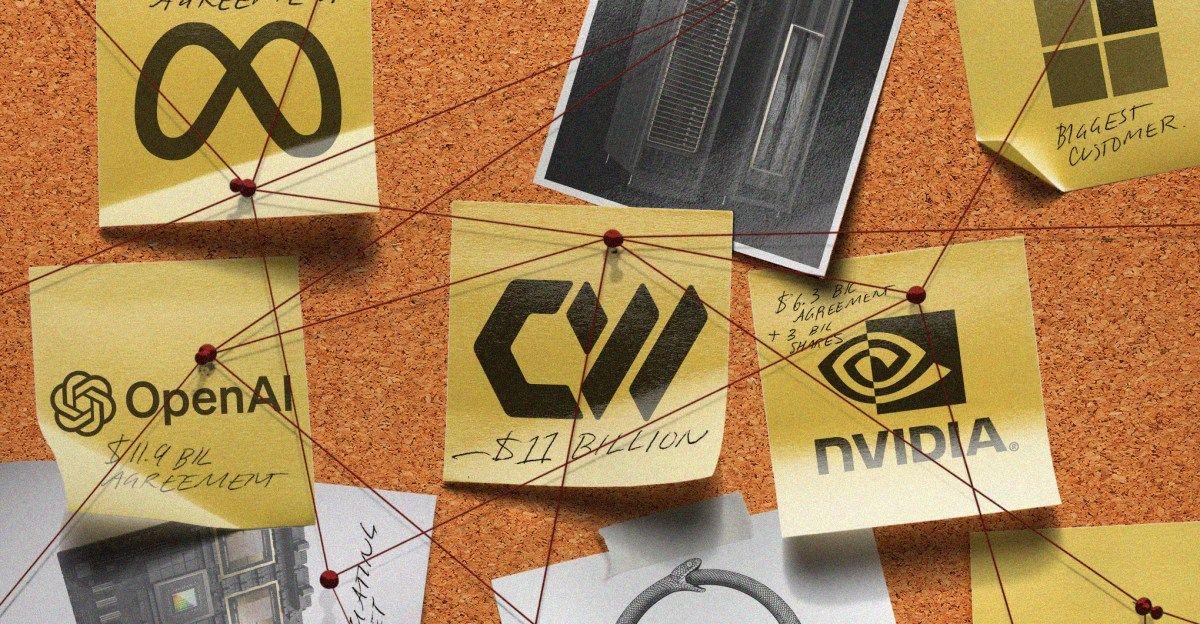Nasdaq 100 Suffers Worst Quarter in Years Amid AI Bubble Fears
3 Sources
3 Sources
[1]
Nasdaq 100's Worst Quarter in Years Sealed by AI Bubble Fears
In a quarter marred by tariff uncertainty, US government spending cuts and the threat of recession, it is fears about a bubble brewing in artificial intelligence that have dealt the latest blow to the Nasdaq 100. The tech-heavy benchmark posted its worst quarter in nearly three years, down 8.3%, after a pair of warnings last week fanned anxieties about a possible pullback in the hundreds of billions of dollars flowing into data center infrastructure. The renewed selling stamped out a nascent rebound and left investors ducking for cover, yet again.
[2]
Nasdaq 100's worst quarter in years sealed by AI bubble fears
In a quarter marred by tariff uncertainty, U.S. government spending cuts and the threat of recession, it is fears about a bubble brewing in artificial intelligence that have dealt the latest blow to the Nasdaq 100. The tech-heavy benchmark posted its worst quarter in nearly three years, down 8.3%, after a pair of warnings last week fanned anxieties about a possible pullback in the hundreds of billions of dollars flowing into data center infrastructure. The renewed selling stamped out a nascent rebound and left investors ducking for cover, yet again. The damage is piling up among the stocks that had, until recently, been the market's biggest drivers. Chipmaker Nvidia Corp. has seen its shares tumble 28% from a January peak. Broadcom Inc. is down 33% from a record in December. Microsoft Corp., Amazon.com Inc., Alphabet Inc. and Meta Platforms Inc. have all fallen 20% or more from their own records. The Nasdaq 100 closed almost unchanged on Monday after falling as much as 2.5% earlier in the day amid worries that President Donald Trump's anticipated tariff rollout on Wednesday will deal a blow to the economy. "The questions about AI are coming at a time when there's increased uncertainty overall, and at a time when they were priced for perfection, or close to it," said Michael Mullaney, director of global market research at Boston Partners. "That makes them an extremely obvious place for investors who are broadly nervous to take profits." Tech behemoths led U.S. stocks higher for most of the past two and a half years on excitement about AI and the future profits it would bring. The companies building AI models are making huge investments in the chips and data centers needed to train and operate their models. At its peak in February, the Nasdaq 100 had more than doubled from a December 2022 low. While the average valuation in the index has fallen to 24 times estimated profits from 27 times last month, prices still remain elevated relative to the average over the past two decades, which sits around 20 times, according to data compiled by Bloomberg. The latest round of hand-wringing on AI was set off last week when Alibaba's co-founder said the rush to erect new facilities is getting ahead of demand for AI services. That was followed a day later by an analyst report about Microsoft -- which alone has earmarked $80 billion for data center spending this year -- walking away from new projects in the U.S. and Europe due to oversupply. The warnings came not long after the emergence of advanced AI models out of China that were trained with fewer computing resources. Those models have challenged assumptions about the resources the U.S. tech giants will need to assure their dominance. Doubts linger even though the four biggest spenders -- Microsoft, Alphabet, Amazon and Meta -- remain committed to capital expense plans that are expected to exceed $300 billion in their current fiscal years. Even a small pullback in that spending would have big implications for companies like Nvidia that have benefited from the flood of money flowing into everything from chips and servers to energy and networking gear. Meanwhile, there are growing questions about how soon AI tools will start to get a broader uptake in corporate America. "If the return on investment was more apparent, there'd be less worry about whether the hyperscalers will continue to invest the way they have been," said Barry Knapp, managing partner at Ironsides Macroeconomics. The selloff has left many AI-related stocks looking attractive to bulls, who expect the spending to continue as demand for the underlying services remains strong. OpenAI is reportedly expecting its revenues to triple this year and it is in talks to raise as much as $40 billion from Softbank Group Corp. and other investors. The pricing of Nvidia at 23 times profits expected over the next 12 months is looking "defensive," according to Melius Research analyst Ben Reitzes. However, the prevailing sentiment on Wall Street right now is clearly one of gloom. That was palpable in the initial public offering market where cloud-computing provider CoreWeave Inc.'s highly anticipated debut last week turned out to be a dud. The Nvidia-backed company, which provides AI computing services, has seen its shares fall about 7% since the offering priced well below its initial target. To Kim Forrest, chief investment officer at Bokeh Capital Partners, the whole picture shows how nervous investors have become about a slowdown in AI spending. "It would have been a feeding frenzy in June of last year," Forrest said of the CoreWeave debut. "All of this adds up to too many dollars chasing too little computing center demand." 2025 Bloomberg News. Distributed by Tribune Content Agency, LLC.
[3]
Nasdaq 100's worst quarter in years sealed by AI bubble fears
In a quarter marred by tariff uncertainty, U.S. government spending cuts and the threat of recession, it is fears about a bubble brewing in artificial intelligence that have dealt the latest blow to the Nasdaq 100. The tech-heavy benchmark posted its worst quarter in nearly three years, down 8.3 per cent, after a pair of warnings last week fanned anxieties about a possible pullback in the hundreds of billions of dollars flowing into data center infrastructure. The renewed selling stamped out a nascent rebound and left investors ducking for cover, yet again. The damage is piling up among the stocks that had, until recently, been the market's biggest drivers. Chipmaker Nvidia Corp. has seen its shares tumble 28 per cent from a January peak. Broadcom Inc. is down 33 per cent from a record in December. Microsoft Corp., Amazon.com Inc. and Alphabet Inc. and Meta Platforms Inc. have all fallen 20 per cent or more from their own records. The Nasdaq 100 closed almost unchanged on Monday after falling as much as 2.5 per cent earlier in the day amid worries that President Donald Trump's anticipated tariff rollout on Wednesday will deal a blow to the economy. "The questions about AI are coming at a time when there's increased uncertainty overall, and at a time when they were priced for perfection, or close to it," said Michael Mullaney, director of global market research at Boston Partners. "That makes them an extremely obvious place for investors who are broadly nervous to take profits." Tech behemoths led U.S. stocks higher for most of the past two and a half years on excitement about AI and the future profits it would bring. The companies building AI models are making huge investments in the chips and data centers needed to train and operate their models. At its peak in February, the Nasdaq 100 had more than doubled from a December 2022 low. While the average valuation in the index has fallen to 24 times estimated profits from 27 times last month, prices still remain elevated relative to the average over the past two decades, which sits around 20 times, according to data compiled by Bloomberg. The latest round of hand-wringing on AI was set off last week when Alibaba's co-founder said the rush to erect new facilities is getting ahead of demand for AI services. That was followed a day later by an analyst report about Microsoft -- which alone has earmarked US$80 billion for data center spending this year -- walking away from new projects in the U.S. and Europe due to oversupply. The warnings came not long after the emergence of advanced AI models out of China that were trained with fewer computing resources. Those models have challenged assumptions about the resources the U.S. tech giants will need to assure their dominance. Doubts linger even though the four biggest spenders -- Microsoft, Alphabet, Amazon and Meta -- remain committed to capital expense plans that are expected to exceed $300 billion in their current fiscal years. Even a small pullback in that spending would have big implications for companies like Nvidia that have benefited from the flood of money flowing into everything from chips and servers to energy and networking gear. Meanwhile, there are growing questions about how soon AI tools will start to get broader uptake in corporate America. "If the return on investment was more apparent, there'd be less worry about whether the hyperscalers will continue to invest the way they have been," said Barry Knapp, managing partner at Ironsides Macroeconomics. The selloff has left many AI related stocks looking attractive to bulls, who expect the spending to continue as demand for the underlying services remains strong. OpenAI is reportedly expecting its revenues to triple this year and it is in talks to raise as much as $40 billion from Softbank Group Corp. and other investors. The pricing of Nvidia at 23 times profits expected over the next 12 months is looking "defensive," according to Melius Research analyst Ben Reitzes. However, the prevailing sentiment on Wall Street right now is clearly one of gloom. That was palpable in the initial public offering market where cloud-computing provider CoreWeave Inc.'s highly anticipated debut last week turned out to be a dud. The Nvidia-backed company, which provides AI computing services, has seen its shares fall about 7 per cent since the offering priced well below its initial target. To Kim Forrest, chief investment officer at Bokeh Capital Partners, the whole picture shows how nervous investors have become about a slowdown in AI spending. "It would have been a feeding frenzy in June of last year," Forrest said of the CoreWeave debut. "All of this adds up to too many dollars chasing too little computing center demand."
Share
Share
Copy Link
The Nasdaq 100 experienced its worst quarter in nearly three years, driven by concerns over an AI bubble and broader economic uncertainties. Tech giants and AI-related stocks saw significant declines as investors worry about potential oversupply in data center infrastructure.

Nasdaq 100's Dramatic Decline
The Nasdaq 100, a tech-heavy benchmark, has posted its worst quarter in nearly three years, plummeting 8.3% amid growing fears of an artificial intelligence (AI) bubble
1
. This decline comes in a quarter already marred by tariff uncertainties, U.S. government spending cuts, and recession threats2
.AI Bubble Concerns
The latest blow to the Nasdaq 100 stems from warnings about a potential pullback in the hundreds of billions of dollars flowing into data center infrastructure. These concerns have reignited anxieties about an AI bubble, leading to renewed selling that has stamped out a nascent rebound
3
.Tech Giants Take a Hit
Major tech companies, which had been driving the market's growth, have seen significant declines:
- Nvidia Corp: Down 28% from its January peak
- Broadcom Inc: Down 33% from its December record
- Microsoft Corp, Amazon.com Inc, Alphabet Inc, and Meta Platforms Inc: All down 20% or more from their records
2
Valuation Concerns
Despite the recent selloff, valuations remain elevated:
- The Nasdaq 100's average valuation has fallen to 24 times estimated profits, down from 27 times last month
- However, this is still above the two-decade average of 20 times
3
Triggers for AI Concerns
Two key events sparked the latest round of AI-related worries:
- Alibaba's co-founder warned that the rush to build new facilities is outpacing demand for AI services
- An analyst report suggested Microsoft, which has allocated $80 billion for data center spending this year, is walking away from new projects in the U.S. and Europe due to oversupply
2
Related Stories
Impact on AI-Related Stocks
The selloff has had significant implications for companies benefiting from AI investments:
- Nvidia's pricing at 23 times expected profits over the next 12 months is now considered "defensive" by some analysts
- CoreWeave Inc., an Nvidia-backed AI computing services provider, saw a disappointing IPO with shares falling about 7% since the offering
3
Future Outlook
Despite the current gloom, some bulls remain optimistic:
- OpenAI is reportedly expecting to triple its revenues this year
- The company is in talks to raise up to $40 billion from investors including SoftBank Group Corp
However, the prevailing sentiment on Wall Street remains cautious, with investors nervous about a potential slowdown in AI spending
2
.References
Summarized by
Navi
Related Stories
AI Fears Trigger Historic Stock Market Sell-Offs as New Tools Spark Disruption Concerns
12 Feb 2026•Business and Economy

AI Bubble Fears Trigger Global Semiconductor Selloff as SoftBank Plunges 40%
21 Nov 2025•Business and Economy

AI Infrastructure Bubble Concerns Mount as CoreWeave's Financial Engineering Raises Red Flags
18 Nov 2025•Business and Economy

Recent Highlights
1
ByteDance's Seedance 2.0 AI video generator triggers copyright infringement battle with Hollywood
Policy and Regulation

2
Demis Hassabis predicts AGI in 5-8 years, sees new golden era transforming medicine and science
Technology

3
Nvidia and Meta forge massive chip deal as computing power demands reshape AI infrastructure
Technology





